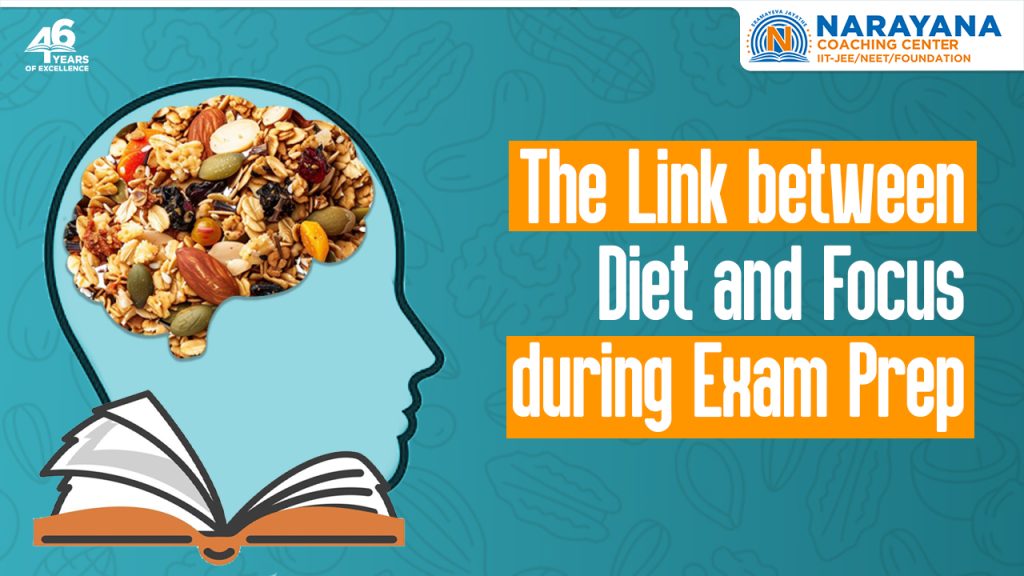
Preparing for exams is both mentally and physically demanding. Students often focus on study schedules, practice papers, and revision strategies, but overlook a key factor that directly impacts concentration and performance—diet. What you eat has a profound effect on how well your brain functions. Just as an athlete fuels the body before a competition, students need the right nutrition to boost memory, maintain focus, and stay energised during intense study sessions.
In this blog, we’ll explore the fascinating link between diet and concentration, highlight brain-boosting foods, and share practical dietary tips to help you excel during exam prep.
Why Does Diet Affect Concentration
Although the brain accounts for just 2% of body weight, it consumes nearly 20% of the body’s energy. To function optimally, it needs a steady supply of nutrients and oxygen. Poor food choices can lead to sluggish thinking, brain fog, and fatigue, while the right diet enhances memory, alertness, and problem-solving skills.
When you eat:
- Complex carbs provide a steady release of glucose to fuel the brain.
- Proteins help create neurotransmitters like dopamine and serotonin, which influence mood and focus.
- Healthy fats such as omega-3s support memory and brain cell communication.
- Vitamins and minerals act as catalysts for mental energy and clarity.
Simply put, your meals can either supercharge or sabotage your study sessions.
Top Brain-Boosting Foods for Exam Prep
1. Fatty Fish (Salmon, Mackerel, Sardines)
Rich in omega-3 fatty acids, these support memory, learning, and overall brain health. Omega-3s help build cell membranes in the brain and improve communication between brain cells.
2. Nuts and Seeds
Almonds, walnuts, chia seeds, and flaxseeds provide vitamin E, magnesium, and plant-based omega-3s. These nutrients protect against cognitive decline and stabilise energy levels.
3. Leafy Green Vegetables
Spinach, kale, and broccoli are loaded with antioxidants, vitamin K, and folate, which improve brain function and slow cognitive ageing.
4. Whole Grains
Brown rice, oats, and whole wheat provide sustained energy by releasing glucose slowly into the bloodstream—keeping the brain alert for longer.
5. Eggs
Eggs contain choline, a nutrient vital for the production of acetylcholine, a neurotransmitter linked to memory and learning.
6. Berries
Blueberries, strawberries, and blackberries are rich in antioxidants and flavonoids that enhance memory and protect brain cells from stress.
7. Dark Chocolate
In moderation, dark chocolate provides flavonoids, caffeine, and antioxidants that improve memory, focus, and mood—a perfect exam-time snack.
8. Water
Dehydration is a common but overlooked cause of poor concentration. Staying hydrated helps the brain perform efficiently.
Foods That Hurt Concentration
Not all foods are created equal, and some can hinder exam performance:
- Sugary snacks and drinks: Cause energy spikes followed by crashes.
- Fast food and fried meals: High in unhealthy fats that impair memory and learning.
- Excess caffeine: While a cup of coffee can help, too much can lead to jitters, anxiety, and poor sleep.
- Processed foods: Often lack essential nutrients and are loaded with preservatives that may harm brain health.
Practical Dietary Tips for Students
1. Eat Balanced Meals
Every meal should include complex carbs, lean protein, healthy fats, and vegetables to maintain steady energy levels.
2. Don’t Skip Breakfast
A healthy breakfast with oats, eggs, or fruit sets the tone for the day and prevents mid-morning sluggishness.
3. Snack Smart
Swap chips and soda for trail mix, yoghurt, or fruit. These snacks provide lasting fuel without the crash.
4. Stay Hydrated
Keep a water bottle nearby and aim for at least 6–8 glasses of water per day.
5. Limit Junk Food
If cravings hit, try healthier alternatives like baked chips, smoothies, or dark chocolate instead of candy bars.
6. Time Your Meals
Heavy meals before studying can make you sleepy. Instead, opt for smaller, frequent meals to sustain concentration.
Lifestyle Factors That Complement a Healthy Diet
While diet is crucial, pairing it with healthy lifestyle choices enhances concentration:
- Adequate Sleep: The brain consolidates memory during sleep. Aim for 7–9 hours.
- Exercise: Physical activity improves blood flow to the brain and boosts mood.
- Mindfulness & Meditation: Help reduce stress and improve focus.
- Study Breaks: Short breaks improve retention and prevent burnout.
Conclusion
The link between diet and concentration during exam prep is clear. Fuelling your brain with nutrient-rich foods helps sharpen focus, improve memory, and maintain energy throughout long study hours. On the other hand, poor food choices can derail your preparation by causing fatigue and brain fog. By making small but powerful dietary changes — like eating balanced meals, staying hydrated, and snacking smart — you can significantly boost your exam performance and give yourself the best chance of success.
FAQs on Diet and Concentration during Exam Prep
Q1. Can eating junk food affect exam performance?
Yes. Junk food is often high in sugar and unhealthy fats, which can impair memory, trigger energy crashes, and reduce focus.
Q2. How many cups of coffee are safe during exam prep?
One to two cups a day are generally fine. Excess caffeine, however, can cause anxiety, restlessness, and poor sleep quality.
Q3. What is the best quick snack for studying?
Nuts, berries, and dark chocolate are excellent snacks that provide quick energy and improve focus.
Q4. Should I eat before an exam?
Yes, but keep it light. A balanced meal with whole grains, protein, and fruit maintains energy without causing sluggishness.
Q5. Can dehydration affect concentration?
Absolutely. Even mild dehydration can lead to headaches, fatigue, and reduced alertness.
Q6. Is it okay to eat late at night while studying?
Yes, but choose light snacks such as fruit, yoghurt, or nuts instead of heavy or greasy foods that may disrupt sleep.
